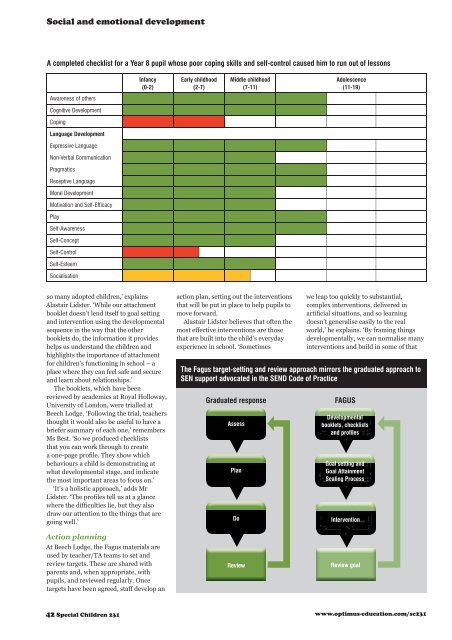champions
1H1C301qFr9
1H1C301qFr9
You also want an ePaper? Increase the reach of your titles
YUMPU automatically turns print PDFs into web optimized ePapers that Google loves.
Social and emotional development<br />
A completed checklist for a Year 8 pupil whose poor coping skills and self-control caused him to run out of lessons<br />
Infancy<br />
(0-2)<br />
Early childhood<br />
(2-7)<br />
Middle childhood<br />
(7-11)<br />
Adolescence<br />
(11-19)<br />
Awareness of others<br />
Cognitive Development<br />
Coping<br />
Language Development<br />
Expressive Language<br />
Non-Verbal Communication<br />
Pragmatics<br />
Receptive Language<br />
Moral Development<br />
Motivation and Self-Effi cacy<br />
Play<br />
Self-Awareness<br />
Self-Concept<br />
Self-Control<br />
Self-Esteem<br />
Socialisation<br />
so many adopted children,’ explains<br />
Alastair Lidster. ‘While our attachment<br />
booklet doesn’t lend itself to goal setting<br />
and intervention using the developmental<br />
sequence in the way that the other<br />
booklets do, the information it provides<br />
helps us understand the children and<br />
highlights the importance of attachment<br />
for children’s functioning in school – a<br />
place where they can feel safe and secure<br />
and learn about relationships.’<br />
The booklets, which have been<br />
reviewed by academics at Royal Holloway,<br />
University of London, were trialled at<br />
Beech Lodge. ‘Following the trial, teachers<br />
thought it would also be useful to have a<br />
briefer summary of each one,’ remembers<br />
Ms Best. ‘So we produced checklists<br />
that you can work through to create<br />
a one-page profile. They show which<br />
behaviours a child is demonstrating at<br />
what developmental stage, and indicate<br />
the most important areas to focus on.’<br />
‘It’s a holistic approach,’ adds Mr<br />
Lidster. ‘The profiles tell us at a glance<br />
where the difficulties lie, but they also<br />
draw our attention to the things that are<br />
going well.’<br />
action plan, setting out the interventions<br />
that will be put in place to help pupils to<br />
move forward.<br />
Alastair Lidster believes that often the<br />
most effective interventions are those<br />
that are built into the child’s everyday<br />
experience in school. ‘Sometimes<br />
Graduated response<br />
Assess<br />
Plan<br />
Do<br />
we leap too quickly to substantial,<br />
complex interventions, delivered in<br />
artificial situations, and so learning<br />
doesn’t generalise easily to the real<br />
world,’ he explains. ‘By framing things<br />
developmentally, we can normalise many<br />
interventions and build in some of that<br />
The Fagus target-setting and review approach mirrors the graduated approach to<br />
SEN support advocated in the SEND Code of Practice<br />
FAGUS<br />
Developmental<br />
booklets, checklists<br />
and profi les<br />
Goal setting and<br />
Goal Attainment<br />
Scaling Process<br />
Intervention<br />
Action planning<br />
At Beech Lodge, the Fagus materials are<br />
used by teacher/TA teams to set and<br />
review targets. These are shared with<br />
parents and, when appropriate, with<br />
pupils, and reviewed regularly. Once<br />
targets have been agreed, staff develop an<br />
Review<br />
Review goal<br />
42 Special Children 231 www.optimus-education.com/sc231


